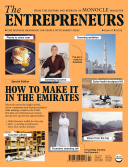
The Entrepreneurs
Monocle meets the bright sparks, clever companies and business-minded folks making a mark in the UAE. Our first ever Entrepreneurs nation special eyes up the key opportunities.
In This Issue
Oops! No content was found.
Looks like we no longer have content for the page you're on. Perhaps try a search?
Return Home

